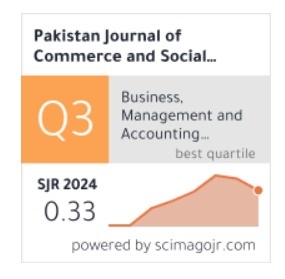Digital Financial Inclusion and Environmental Sustainability Nexus: Evidence from South Asian Economies
Keywords:
Digital financial inclusion, CO2 emissions, industrialization, internet users, renewable energy consumption, urbanization.Abstract
The concept of digital financial inclusion (DFI) has gained considerable attention in recent years due to its emergence as a prominent development strategy in several nations. While environmental sustainability is one of the biggest aims of the earth today. This study examines the impact of DFI on the environmental sustainability of the South Asian region (Pakistan, India, Bangladesh and Afghanistan) from 2011 to 2021. Using STATA, the study employed the generalized method of moments (GMM) technique, and the empirical evidence demonstrates that DFI has a significant negative impact on environmental sustainability by increasing CO2 emissions. In addition, study indicates that the growing number of internet users and renewable energy consumption have a substantial adverse effect on CO2 emissions per capita. This suggests that the increased use of the internet and renewable energy consumption contribute to environmental sustainability. On the other hand, Population growth also has a significant negative impact on CO2 emissions per capita and GDP growth and industrialization has no significant impact on environmental sustainability. These findings indicate that policymakers in the South Asian region should design policies that promote DFI and the use of new technology in such a way that stimulate business activities and achieve environmental sustainability.





